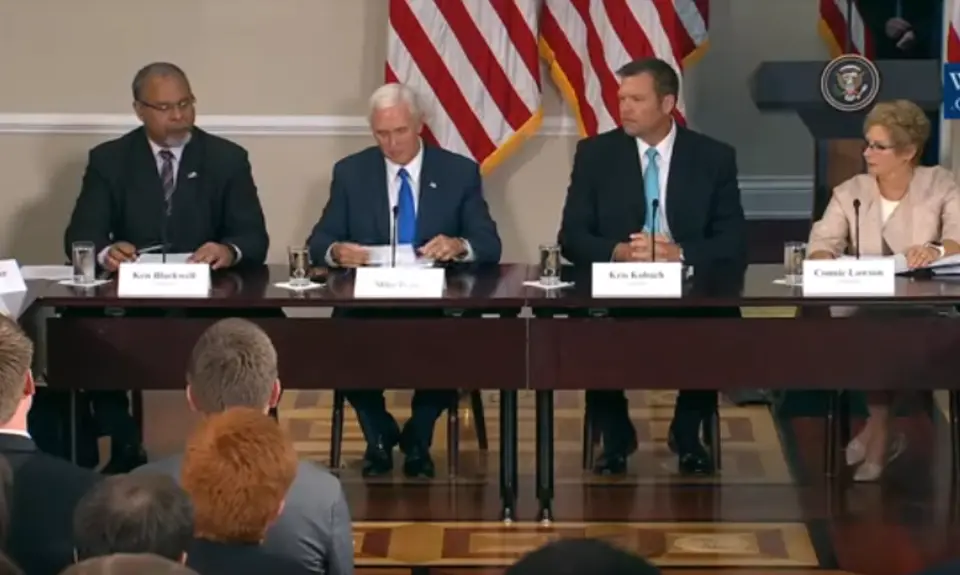The White House announced last night that President Trump would disband his “commission on election integrity,” which he had established in an effort to prove his baseless claims that he lost the popular vote in 2016 only because of widespread voter fraud. The commission started out with a ludicrous mission and continued as a partisan farce, providing the opportunity for some of the country’s strongest advocates of voter suppression policies to present half-baked theories about widespread voter fraud while earning the criticism of civil rights groups, Republican secretaries of state and the commission’s own Democratic members.
The White House quickly moved to blame the debacle on former chief strategist Steve Bannon, who has been locked in an ugly feud with Trump about comments he made to the author of a new book. One White House official said the commission was Bannon’s idea “and it was not a good one.”
In May, Trump tapped Kansas Secretary of State Kris Kobach, a leading crusader for suppressive voting laws, to head the commission along with Vice President Mike Pence. Kobach and Pence quickly assembled a who’s who of voter suppression advocates to join the panel, including former Federal Election Commission member and current Heritage Foundation fellow Hans von Spakovsky, former Ohio secretary of state and current Family Research Council official Ken Blackwell, and former DOJ attorney and voter-roll-purge advocate J. Christian Adams.
Later in the year, a FOIA request turned up a February email that von Spakovsky had sent to unidentified recipients and had been forwarded to Attorney General Jeff Sessions in which von Spakovsky had advocated for the commission to exclude Democrats and even “mainstream Republicans and/or academics.” Although the commission did end up including Democratic members, one Democratic member eventually sued the commission, saying that he and his fellow Democrats had been “excluded” from its real work. In one case, two Democratic commissioners said that they didn’t even know of the existence of a commission staff member until he was arrested on child pornography charges.
While the commission’s Democratic members claimed to have been kept in the dark on much of the commission’s work, its far-right members seem to have had outsized influence. In July, the fledgling commission sent a letter to every state asking for extensive data on their voter rolls. Nearly every state refused to completely comply with the request; Mississippi’s Republican secretary of state said that the commission could “go jump in the Gulf of Mexico.” It later came out that Kobach had sought the help of von Spakovsky and Adams in writing the letter, even though neither had yet been formally named to the commission.
In the end, the commission only held two meetings. After the first, Kobach told MSNBC that “we may never know” whether Hillary Clinton actually won the popular vote in 2016. The second came after a deeply embarrassing week in which Kobach had written a paid column for Breitbart alleging that a Democrat’s victory in New Hampshire’s 2016 Senate election was due to widespread fraud, his supposed evidence for which was laughably easy to debunk. Kobach’s Breitbart column overshadowed the other fuzzy math and bizarre ideas the panel discussed, including hearing from a gun-rights researcher who suggested conducting gun-style background checks on potential voters.
Trump’s commission was an embarrassment from start to finish, but its work hasn’t disappeared. Kobach told The New York Times that a decision to kick the commission’s work to the Department of Homeland Security was an “option play” meant to leave the work in the hands of an agency that is “going to be able to move faster and more efficiently” than the commission. Kobach told the Times that the department’s first step would be to “marshal its files on immigrants, legal and otherwise, so that they can be matched with lists of registered voters nationwide to detect foreign citizens who are illegally casting ballots in American elections.” Maine Secretary of State Matthew Dunlap, the Democratic commissioner who had sued, told the Washington Post that DHS “could angle to change regulations affecting voter identification and other matters affecting voting without as much public scrutiny.”








